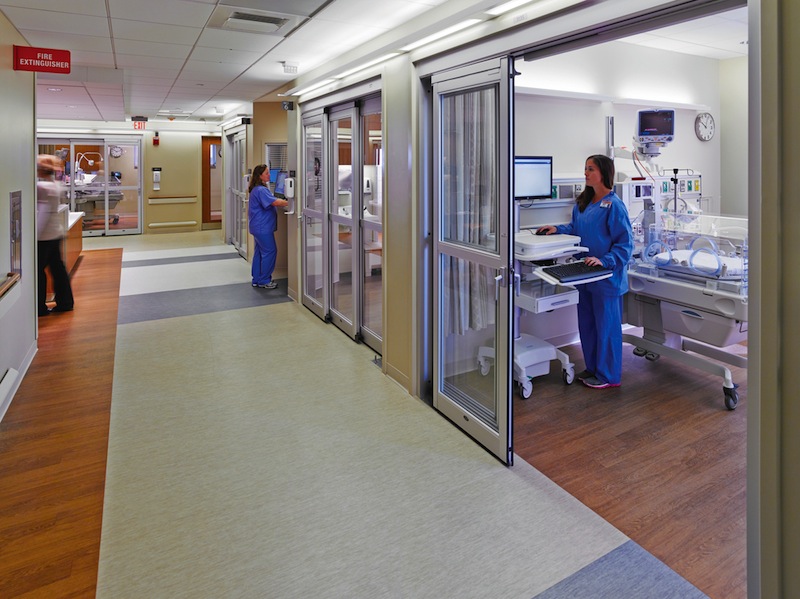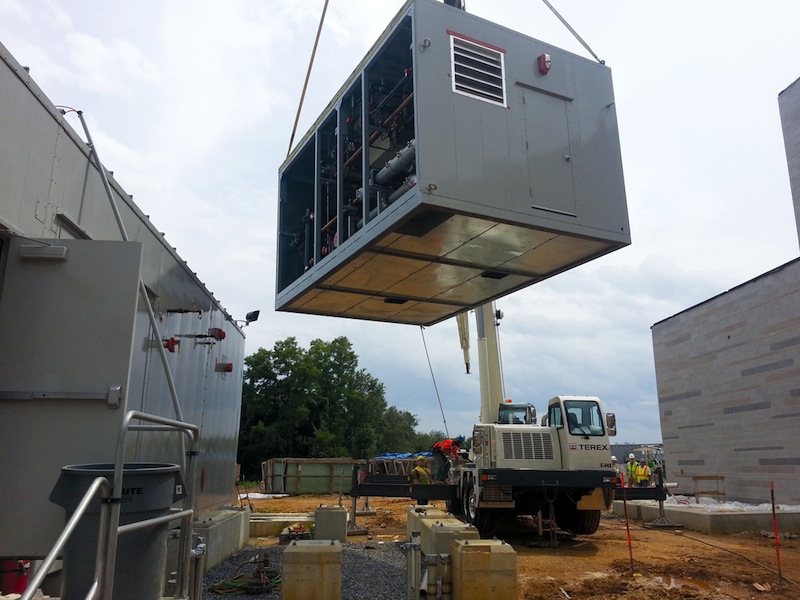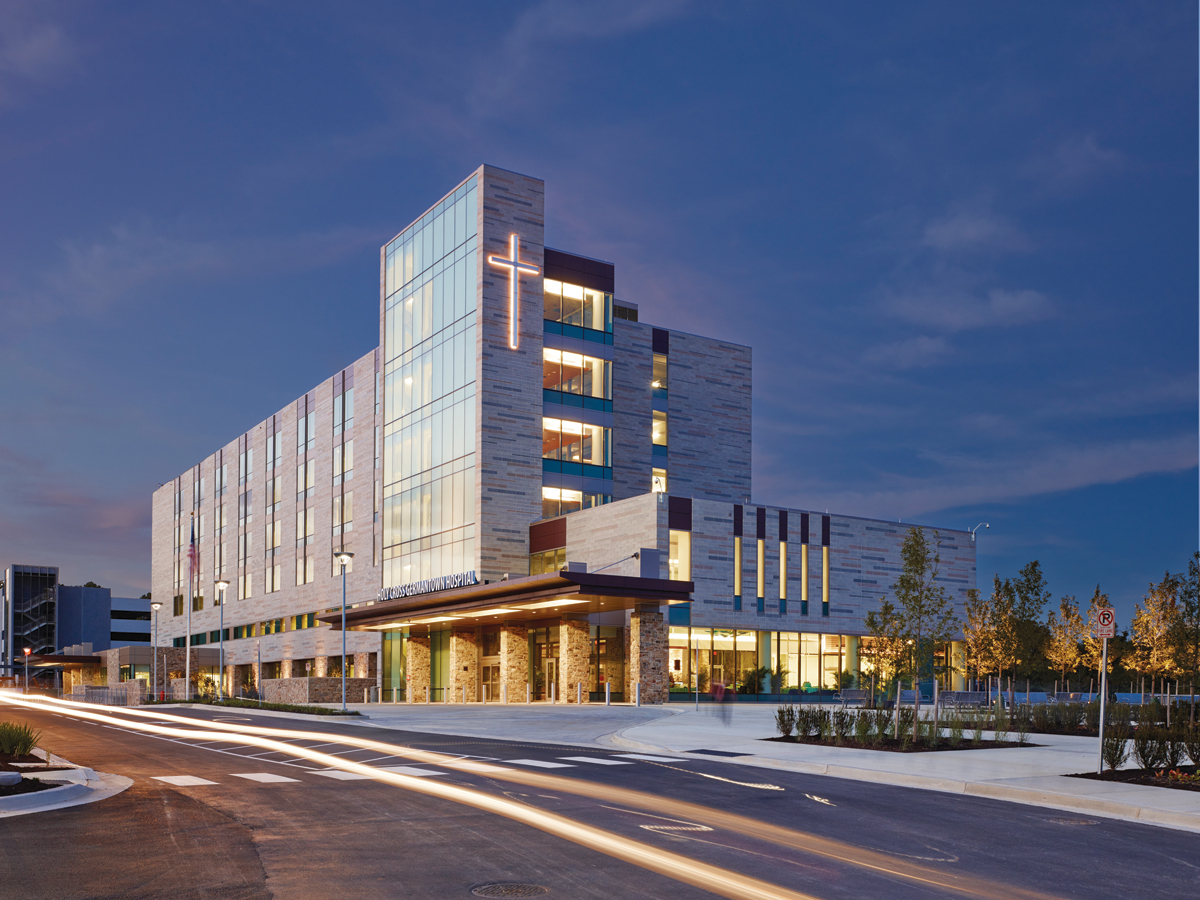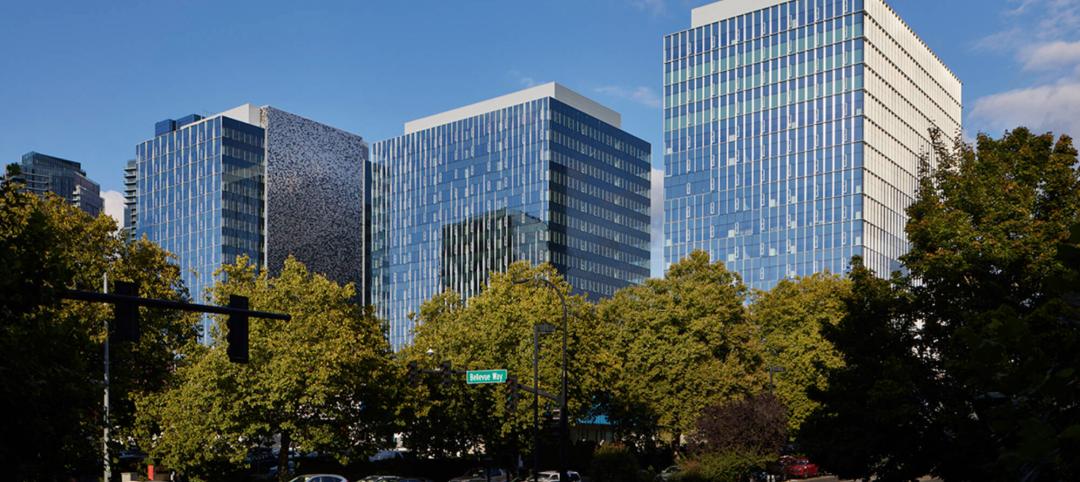Holy Cross Health, a Catholic healthcare system in Maryland, opened its new 237,000-sf hospital in Germantown last October 1, thanks to a Building Team—led by SmithGroupJJR (architect), CBRE Healthcare (PM), and Whiting-Turner (GC/CM)—that simply wouldn’t give up, despite the obstacles it faced.
The 93-bed Holy Cross Germantown Hospital is the first new hospital to be built in Maryland in 25 years, the first new hospital in Montgomery County in 35 years, and the first in the U.S. to be built on a community college campus. Yet it was threatened from the very beginning.
PROJECT SUMMARY
GOLD AWARD
Holy Cross Germantown Hospital
Germantown, Md.BUILDING TEAM
Submitting firm: SmithGroupJJR (architect)
Owner: Holy Cross Health
Project manager: CBRE Healthcare
SE: McMullan & Associates, Inc.
MEP: Syska Hennessy Group
CE/Landscaping: Macris, Hendricks and Glasscock
GC/CM: Whiting-TurnerGENERAL INFORMATION
Project size: 237,000 gsf (93 beds)
Construction cost: $110 million; $200 million total project budget
Construction period: June 2012 to September 2014
Delivery method: CM at risk
Seven years ago, Holy Cross Health President Kevin Sexton asked SmithGroupJJR to explore a partnership with Montgomery College Germantown for a new hospital on its campus. The master plan had to go through two cycles to get the go-ahead from county commissioners; then the Maryland–National Capital Park and Planning Commission had to give its OK. By October 2008, Sexton had funding in the bag from Holy Cross’s parent, Trinity Health, and was ready to file a certificate of need. That’s when all hell broke loose.
First, a rival hospital system contested Holy Cross’s CON. Worse still, the recession forced Trinity to pull the plug on all construction in its system.
On its own dime, SmithGroupJJR convened a two-day “workshop” in San Francisco with Whiting-Turner and others to explore ways to build a more cost-effective “hypothetical” 100-bed hospital. They took their recommendations back to Sexton, and within a year, he had the green light from Trinity. Holy Cross Germantown had new life.
just for fun, let’s add a few MORE HURDLES
In the interim, Trinity had issued new mandatory design criteria: projects were to be held to no more than $750,000 and 2,100 sf per bed. The state also tightened up its CON requirements and gave the Building Team only 90 days to develop a CON package that would meet the new criteria.
Using ideas derived from the workshop, the team came up with a three-point plan: 1) split the facility into two components—a patient tower with diagnostic and treatment facilities, and a support wing; 2) specify discrete structural, mechanical, and utility systems for each component, which would reduce costs, simplify MEP distribution, and yield more total square footage; and 3) build a prefabricated modular central utility plant that would be exempt from the CON-mandated square footage, thus yielding more clinical space.
This design scheme resulted in 30–40% savings in the sf/bed ratio. In May 2012, the Maryland Health Care Commission unanimously approved the CON. Holy Cross Germantown breathed yet another life.
Holy Cross Health’s mission called for prudence, not opulence. To fulfill that goal, the Building Team used full-scale, furnished mockups for labor/delivery, med/surg, and ICU patient rooms to get feedback from clinicians. The resulting design saved costs by reducing the amount of casework along footwalls. In reviewing bathroom mockups, Whiting-Turner suggested constructing the concrete slabs with a three-foot-radius swale sloped to the shower drain rather than a rectangular depression. This saved $125,000.
Midway through construction, a new head of surgery asked the team to consider a same-handed approach to the surgical suite layout, rather than the customary mirrored floor plan. This complicated the above-ceiling coordination for medical gases, supply air, light booms, and supports, especially since the plumbing and electrical sleeves were already in place. The team constructed virtual mockups to coordinate the work, which was completed with minimal disruption.
Note: SmithGroupJJR’s Bill Kline, a member of the awards jury, recused himself from this project.
 Maternity services include labor and delivery rooms, caesarean surgical suites, private postpartum rooms, and an eight-bed neonatal care unit.
Maternity services include labor and delivery rooms, caesarean surgical suites, private postpartum rooms, and an eight-bed neonatal care unit.
 A prefabricated module is lifted into place for the central utility plant. Prefabrication enabled the components to be shipped in large sections like this and assembled ready for operation in less than three weeks.
A prefabricated module is lifted into place for the central utility plant. Prefabrication enabled the components to be shipped in large sections like this and assembled ready for operation in less than three weeks.
Related Stories
AEC Tech Innovation | Oct 8, 2024
New ABC technology report examines how AI can enhance efficiency, innovation
The latest annual technology report from Associated Builders and Contractors delves into how artificial intelligence can enhance efficiency and innovation in the construction sector. The report includes a resource guide, a case study, insight papers, and an essay concerning applied uses for AI planning, development, and execution.
Healthcare Facilities | Oct 8, 2024
Herzog & de Meuron completes Switzerland’s largest children’s hospital
The new University Children’s Hospital Zurich features 114 rooftop patient rooms designed like wooden cottages with their own roofs. The project also includes a research and teaching facility.
Mixed-Use | Oct 7, 2024
New mixed-use tower by Studio Gang completes first phase of San Francisco waterfront redevelopment
Construction was recently completed on Verde, a new mixed-use tower along the San Francisco waterfront, marking the end of the first phase of the Mission Rock development. Verde is the fourth and final building of phase one of the 28-acre project that will be constructed in several phases guided by design principles developed by a design cohort led by Studio Gang.
Brick and Masonry | Oct 7, 2024
A journey through masonry reclad litigation
This blog post by Walter P Moore's Mallory Buckley, RRO, PE, BECxP + CxA+BE, and Bob Hancock, MBA, JD, of Munsch Hardt Kopf & Harr PC, explains the importance of documentation, correspondence between parties, and supporting the claims for a Plaintiff-party, while facilitating continuous use of the facility, on construction litigation projects.
Glass and Glazing | Oct 7, 2024
Pattern language: An exploration of digital printing on architectural glazing
Architectural Glazing has long been an important expressive tool which, when selected and detailed thoughtfully, can contribute to the successful transformation of architectural concepts to reality.
University Buildings | Oct 4, 2024
Renovations are raising higher education campuses to modern standards
AEC higher ed Giants report working on a variety of building types, from performing arts centers and libraries to business schools. Hybrid learning is seemingly here to stay. And where possible, these projects address wellness and mental health concerns.
AEC Tech | Oct 3, 2024
4 ways AI impacts building design beyond dramatic imagery
Kristen Forward, Design Technology Futures Leader, NBBJ, shows four ways the firm is using AI to generate value for its clients.
Laboratories | Oct 2, 2024
Trends in scientific research environments: Q&A with Flad's Matt McCord
As part of an ongoing series, Matt McCord, AIA, NCARB, LEED AP BD+C, Associate Principal with Flad Architects, discusses the future of the scientific workplace.
Museums | Oct 1, 2024
UT Dallas opens Morphosis-designed Crow Museum of Asian Art
In Richardson, Tex., the University of Texas at Dallas has opened a second location for the Crow Museum of Asian Art—the first of multiple buildings that will be part of a 12-acre cultural district. When completed, the arts and performance complex, called the Edith and Peter O’Donnell Jr. Athenaeum, will include two museums, a performance hall and music building, a grand plaza, and a dedicated parking structure on the Richardson campus.
Data Centers | Oct 1, 2024
10 biggest impacts to the data center market in 2024–2025
While AI sends the data center market into the stratosphere, the sector’s accelerated growth remains impacted by speed-to-market demands, supply chain issues, and design innovation necessities.

















